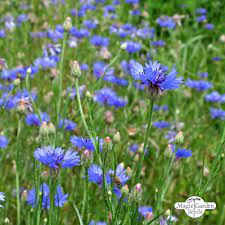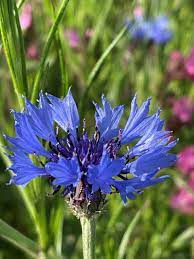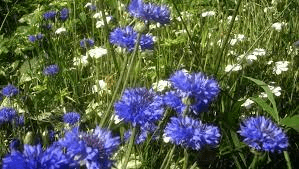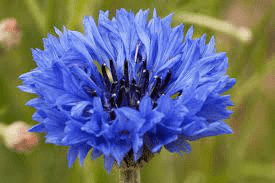Centaurea cyanus, commonly known as Cornflower or Bachelor’s Button, is an annual flowering plant belonging to the Asteraceae family. Native to Europe, this charming wildflower has become popular for its vivid blue blossoms and is often cultivated for ornamental and symbolic purposes.
Morphologically, Cornflower is a slender plant that typically reaches heights of 30 to 90 centimeters. The leaves are lance-shaped and gray-green, and the flowers are characterized by their distinctive intense blue color, though pink, white, and purple varieties can also be found. The flower heads are composed of tubular florets surrounded by vibrant, spiky bracts.
Cornflowers are often associated with cultural symbolism and have been used historically for various purposes. In the language of flowers, the Cornflower is said to symbolize delicacy, refinement, and the pursuit of one’s dreams. The flower has also been used as a traditional remedy in herbal medicine.
In traditional herbalism, Cornflower has been utilized for its potential medicinal properties, although it is not as extensively studied as some other herbs. The flowers were historically infused to make a tea that was believed to have mild diuretic and anti-inflammatory effects. Additionally, Cornflower was employed topically in the form of poultices or compresses for soothing irritated eyes.
Culturally, Cornflower has found its way into gardens and floral arrangements due to its attractive and distinctive appearance. The flower’s intense blue color makes it a sought-after addition to both wildflower gardens and more formal landscapes.
While Cornflower is generally considered safe for ornamental and traditional uses, it’s important to exercise caution when considering any plant for medicinal purposes. Consultation with healthcare professionals is advisable before using Cornflower or any herbal remedy, especially for internal applications.
Cornflower’s popularity in gardens, its cultural significance, and its potential historical uses contribute to its continued appeal. As with many plants, ongoing research may shed more light on its potential benefits and applications.
The Botanical Description of Cornflower
1. Growth Habit: Cornflower (Centaurea cyanus) is an annual herbaceous plant with an upright growth habit, reaching heights of 30 to 90 centimeters.
2. Leaves: The leaves are lance-shaped and alternate along the stem. They have a grayish-green color, and their margins may be serrated.
3. Flowers: Cornflower is best known for its vibrant, deep blue flowers, each measuring approximately 3 to 4 centimeters in diameter. The central disc is surrounded by characteristic ray florets.
4. Stem: The stem is slender, branched, and covered with fine hairs. It bears multiple flower heads, creating a visually appealing display.
5. Root System: Cornflower has a fibrous root system that helps anchor the plant in well-drained soils.
6. Aroma: The plant has a mild, earthy aroma when crushed, but it is not as fragrant as some other flowering herbs.
7. Blooming Period: Cornflower typically blooms in late spring to early summer, adding a burst of color to meadows and fields.
8. Habitat: It thrives in sunny locations with well-drained soil and is often found in grasslands, meadows, and along roadsides.
9. Varieties: While the classic blue variety is most common, there are also pink, white, and purple varieties of Cornflower, offering a range of color options.
The Geographic Distribution of Cornflower

1. Europe: Cornflower is native to Europe, where it has been cultivated and appreciated for centuries.
2. Asia: It has been introduced to various parts of Asia, where it is grown for both ornamental and medicinal purposes.
3. North America: Cornflower has naturalized in parts of North America, particularly in regions with temperate climates.
4. Australia: Introduced to Australia, Cornflower can be found in certain regions where it has adapted to local conditions.
5. Cultivation Worldwide: Due to its charming appearance and cultural significance, Cornflower is cultivated in gardens around the world.
6. Temperate Climates: Cornflower thrives in temperate climates and is well-suited to regions with distinct seasons.
7. Well-Drained Soils: The plant prefers well-drained soils and can tolerate different soil types, making it adaptable to various environments.
8. Altitude Range: Cornflower can be found at a range of altitudes, from lowland areas to moderately elevated regions.
The Chemical Composition of Cornflower
1. Anthocyanins: Responsible for the vivid blue color of the flowers, anthocyanins also contribute antioxidant properties.
2. Flavonoids: Cornflower contains various flavonoids, which have antioxidant and anti-inflammatory effects.
3. Tannins: Tannins are present in Cornflower and may contribute to its astringent properties.
4. Essential Oils: The plant produces essential oils that add to its subtle aroma and may have therapeutic benefits.
5. Coumarins: Cornflower contains coumarins, which are compounds with potential anticoagulant and blood-thinning effects.
6. Polysaccharides: These complex carbohydrates may play a role in Cornflower’s medicinal properties.
7. Alkaloids: While present in smaller amounts, alkaloids contribute to the overall chemical composition of Cornflower.
8. Terpenoids: Cornflower contains terpenoids, which are compounds with various biological activities, including antimicrobial properties.
9. Cyanogenic Glycosides: These compounds are present in Cornflower and may release small amounts of hydrogen cyanide when metabolized.
10. Phenolic Acids: Cornflower contains phenolic acids, which have antioxidant and anti-inflammatory properties.
11. Beta-Carotene: The plant contains beta-carotene, a precursor to vitamin A, contributing to its nutritional profile.
12. Minerals: Cornflower contains minerals such as potassium, calcium, and magnesium, adding to its overall nutritional value.
Read Also: 19 Medicinal Health Benefits Of Ash Trees (Fraxinus)
The Medicinal Health Benefits Of Cornflower (Centaurea cyanus)

1. Anti-Inflammatory Properties: Cornflower possesses anti-inflammatory compounds, making it potentially beneficial for conditions involving inflammation.
2. Antioxidant Effects: The presence of anthocyanins and flavonoids contributes to Cornflower’s antioxidant properties, protecting cells from oxidative stress.
3. Eye Health: Traditionally used for eye health, Cornflower may help alleviate eye strain and discomfort. It is often used in herbal eye drops.
4. Skin Care: Cornflower is known for its soothing properties and is used in skincare products to calm irritated skin and reduce redness.
5. Respiratory Support: In herbal remedies, Cornflower is sometimes used to support respiratory health and alleviate symptoms of conditions like coughs.
6. Digestive Aid: The tannins in Cornflower may confer mild astringent properties, contributing to its traditional use as a digestive aid.
7. Anti-Anxiety Effects: Some herbal practitioners suggest that Cornflower may have calming effects, contributing to its traditional use for anxiety relief.
8. Diuretic Properties: Cornflower has mild diuretic properties, promoting urine production and potentially supporting kidney function.
9. Menstrual Discomfort: Traditionally, Cornflower has been used to alleviate symptoms of menstrual discomfort, including cramps.
10. Cardiovascular Support: The antioxidant and anti-inflammatory properties of Cornflower may contribute to cardiovascular health.
11. Immune System Boost: The flavonoids in Cornflower may support the immune system by enhancing its response to infections.
12. Analgesic Effects: Cornflower may have mild analgesic effects, providing relief from minor pains and discomfort.
13. Antimicrobial Activity: Some compounds in Cornflower exhibit antimicrobial activity, potentially aiding in the prevention of infections.
14. Wound Healing: Applied topically, Cornflower may contribute to the healing of minor wounds and skin irritations.
15. Anti-Cancer Properties: While preliminary, some studies suggest that certain compounds in Cornflower may have anti-cancer properties.
16. Anti-Allergic Effects: Cornflower’s anti-inflammatory properties may help alleviate symptoms of allergies.
17. Relaxation and Sleep Aid: The calming effects of Cornflower may promote relaxation and contribute to improved sleep quality.
18. Oral Health: Due to its mild astringency, Cornflower is sometimes used in oral care products for gum health.
The Methods of Usage to Achieve the Provided Health Benefits Of Cornflower (Centaurea cyanus)
1. Cornflower Tea: One of the most common methods, preparing a soothing tea with dried Cornflower petals is an effective way to enjoy its benefits. Steep a teaspoon of dried petals in hot water for 10 minutes.
2. Eye Compress: Use a cooled infusion of Cornflower as an eye compress to alleviate eye strain and reduce puffiness around the eyes. Soak a clean cloth in a diluted Cornflower solution and place it over closed eyelids for 10-15 minutes.
3. Topical Applications: Create a skin-soothing solution by infusing Cornflower petals in a carrier oil. This infused oil can be applied topically to calm irritated skin, reduce redness, and promote overall skin health.
4. Inhalation: Inhaling the steam from a bowl of hot water infused with Cornflower petals may provide respiratory benefits, helping to ease symptoms of coughs or congestion.
5. Cornflower Tinctures: Tinctures made from Cornflower may offer a concentrated form of its medicinal properties. These can be diluted in water or added to herbal formulations.
6. Herbal Eye Drops: Commercially available herbal eye drops often contain Cornflower extracts. These are used to relieve eye strain and dryness.
7. Culinary Uses: While not as common, Cornflower petals can be used in culinary creations, adding a touch of color and a subtle floral flavor to salads, desserts, or beverages.
8. Cornflower Capsules: For a convenient way to incorporate Cornflower into a daily routine, capsules containing dried Cornflower petals are available. Follow recommended dosage guidelines.
9. Skin Care Products: Look for skincare products that contain Cornflower extracts or essential oil. These can include creams, lotions, and serums designed to soothe and nourish the skin.
10. Aromatherapy: Use Cornflower essential oil in aromatherapy diffusers to create a calming atmosphere. The gentle aroma may contribute to relaxation and stress reduction.
The Side Effects Of Using Cornflower Medicinal Plant
1. Allergic Reactions: While rare, some individuals may be sensitive to Cornflower. Perform a patch test before using topically or consuming to check for potential allergic reactions.
2. Pregnancy Precautions: Pregnant individuals should exercise caution and consult with a healthcare professional before using Cornflower, especially in concentrated forms.
3. Photosensitivity: Cornflower essential oil may cause photosensitivity in some individuals. Avoid sun exposure after topical application.
4. Interaction with Medications: Cornflower may interact with certain medications, including anticoagulants and medications metabolized by the liver. Consult with a healthcare provider if taking such medications.
5. Digestive Discomfort: Excessive consumption of Cornflower tea may lead to digestive discomfort in some individuals. Moderation is key.
6. Sedative Effects: Cornflower’s calming properties may enhance the effects of sedative medications. Avoid excessive sedation by consulting with a healthcare professional.
7. Cross-Reactivity: Individuals with known allergies to plants in the Asteraceae family may experience cross-reactivity with Cornflower.
8. Blood Pressure Effects: Cornflower may have mild hypotensive effects. Individuals with low blood pressure should monitor their levels and consult with a healthcare professional.
9. Not Suitable for Children: Some preparations of Cornflower may not be suitable for children. Consult with a pediatrician before using Cornflower products on or for children.
10. Hormonal Effects: Limited research suggests that Cornflower may have hormonal effects. Individuals with hormone-sensitive conditions should seek guidance from a healthcare professional.
11. Respiratory Sensitivity: Individuals with respiratory conditions may experience sensitivity to inhaled Cornflower steam. Discontinue use if respiratory symptoms worsen.
12. Potential for Skin Irritation: Topical applications of Cornflower-infused products may cause skin irritation in some individuals. Discontinue use if redness, itching, or swelling occurs.
13. Drowsiness: Some individuals may experience drowsiness, especially when using Cornflower in combination with medications that induce sleepiness.
Read Also: 16 Medicinal Health Benefits Of Polemonium reptans (Spreading Jacob’s Ladder)
The Scientific Research and Studies of Cornflower

1. Anti-Inflammatory Effects: Scientific studies have supported the anti-inflammatory effects of Cornflower, validating its traditional use for inflammatory conditions.
2. Antioxidant Properties: Research indicates that Cornflower exhibits antioxidant properties, attributed to the presence of anthocyanins and flavonoids.
3. Ocular Health: Studies suggest that Cornflower extracts may have benefits for ocular health, supporting its traditional use for eye-related issues.
4. Respiratory Benefits: Scientific investigations have explored the potential respiratory benefits of Cornflower, supporting its traditional use for respiratory conditions.
5. Diuretic Activity: Some studies have demonstrated the diuretic activity of Cornflower, validating its traditional use for promoting urine production.
6. Analgesic Effects: Preliminary research suggests that Cornflower may have mild analgesic effects, providing a scientific basis for its traditional use for pain relief.
7. Antimicrobial Properties: Scientific studies have identified antimicrobial compounds in Cornflower, supporting its traditional use for preventing infections.
8. Relaxation Effects: Research has explored the calming effects of Cornflower, contributing to its traditional use for relaxation and anxiety relief.
9. Wound Healing: Scientific investigations have shown that Cornflower extracts may contribute to the wound healing process.
10. Anticancer Potential: Some compounds found in Cornflower, such as flavonoids, have demonstrated potential anticancer properties in laboratory studies.
11. Immunomodulatory Effects: Scientific studies suggest that Cornflower may have immunomodulatory effects, influencing the immune system’s response to infections.
The Safety Precautions and Recommendations In Using Cornflower Medicinal Plant
1. Patch Test: Before using Cornflower topically or internally, perform a patch test to check for any allergic reactions, especially if you have sensitive skin.
2. Consultation with Healthcare Professional: If pregnant, breastfeeding, or taking medications, consult with a healthcare professional before using Cornflower, especially in concentrated forms.
3. Sun Protection: If using Cornflower essential oil topically, avoid sun exposure to prevent photosensitivity reactions.
4. Moderation in Consumption: Consume Cornflower tea or other preparations in moderation to avoid potential digestive discomfort.
5. Monitor Blood Pressure: Individuals with low blood pressure should monitor their levels when using Cornflower, as it may have mild hypotensive effects.
6. Pediatric Consultation: Consult with a pediatrician before using Cornflower products on or for children, as some preparations may not be suitable.
7. Respiratory Sensitivity: Individuals with respiratory conditions should exercise caution when inhaling Cornflower steam and discontinue use if respiratory symptoms worsen.
8. Discontinue in Case of Irritation: If using Cornflower-infused products causes skin irritation, discontinue use and seek alternative remedies.
9. Consultation for Hormone-Sensitive Conditions: Individuals with hormone-sensitive conditions should seek guidance from a healthcare professional before using Cornflower, as it may have hormonal effects.
10. Monitor for Drowsiness: Be cautious when using Cornflower in combination with medications that induce drowsiness, as it may enhance sedative effects.
11. Cross-Reactivity: Individuals with known allergies to plants in the Asteraceae family should be aware of the potential for cross-reactivity with Cornflower.
12. Respiratory Sensitivity: Individuals with respiratory conditions should exercise caution when inhaling Cornflower steam and discontinue use if respiratory symptoms worsen.
13. Potential for Skin Irritation: Topical applications of Cornflower-infused products may cause skin irritation in some individuals. Discontinue use if redness, itching, or swelling occurs.
FAQs About Cornflower Medicinal Plant
1. Is Cornflower Safe for Daily Consumption?
Yes, when consumed in moderation, Cornflower is generally safe for daily use. However, individuals with specific health conditions should consult with a healthcare professional.
2. Can Cornflower Tea Help with Anxiety?
Cornflower tea is traditionally believed to have calming effects that may contribute to anxiety relief. Individual responses may vary.
3. Are There Any Contraindications for Cornflower Use?
Individuals with allergies to plants in the Asteraceae family or those with specific health conditions should exercise caution and consult with a healthcare professional.
4. Can Cornflower Be Used During Pregnancy?
Pregnant individuals should consult with their healthcare provider before using Cornflower, especially in concentrated forms, due to potential effects on uterine activity.
5. How Long Does it Take to Experience the Medicinal Benefits of Cornflower Tea?
The time to experience benefits can vary. Consistent use over time is often recommended for gradual results.
6. Can Cornflower Essential Oil Be Used for Aromatherapy?
Yes, Cornflower essential oil can be used in aromatherapy diffusers to create a calming atmosphere.
7. Is Cornflower Safe for Children?
While generally safe, it’s advisable to consult with a pediatrician before using Cornflower products on or for children, as some preparations may not be suitable.
8. Can Cornflower Be Used for Skin Conditions?
Yes, Cornflower-infused oils or creams can be applied topically for various skin conditions. Perform a patch test and discontinue if irritation occurs.
9. Can Cornflower Cause Gastrointestinal Discomfort?
In rare cases, excessive consumption of Cornflower tea may cause gastrointestinal discomfort. Following recommended dosages is important to avoid such effects.
10. Can Cornflower Be Combined with Other Herbal Supplements?
Combining Cornflower with other herbal supplements should be done cautiously, and it’s advisable to seek guidance from a healthcare professional to avoid potential interactions.
11. Can Cornflower Be Used for Pets?
The use of Cornflower in pets should be avoided unless specifically recommended by a veterinarian. Pets may react differently to herbs, and professional guidance is crucial.
12. Is Cornflower Safe for Individuals with Liver Conditions?
Individuals with liver conditions should seek medical advice before using Cornflower, as some herbal compounds may affect liver function.
13. Can Cornflower Cause Photosensitivity?
Cornflower oil may cause photoallergic reactions in some individuals. Avoid sun exposure after applying Cornflower oil topically.
14. Can Cornflower Be Used During Breastfeeding?
Breastfeeding individuals should consult with their healthcare provider before using Cornflower, especially in concentrated forms, due to potential effects on lactation.
15. Can Cornflower Be Used for Anxiety?
Cornflower’s calming effects may contribute to anxiety relief. However, individual responses may vary, and consultation with a healthcare provider is recommended.
16. Can Cornflower Be Used for Allergies?
Cornflower’s anti-allergic effects may provide relief for some allergy symptoms. However, individual responses vary, and it’s advisable to consult with a healthcare professional.
17. Can Cornflower Be Used for Headaches?
While not a primary remedy for headaches, the calming effects of Cornflower may offer mild relief. Consult with a healthcare professional for proper headache management.
Read Also: Meaning and the Various Flotation Processes

